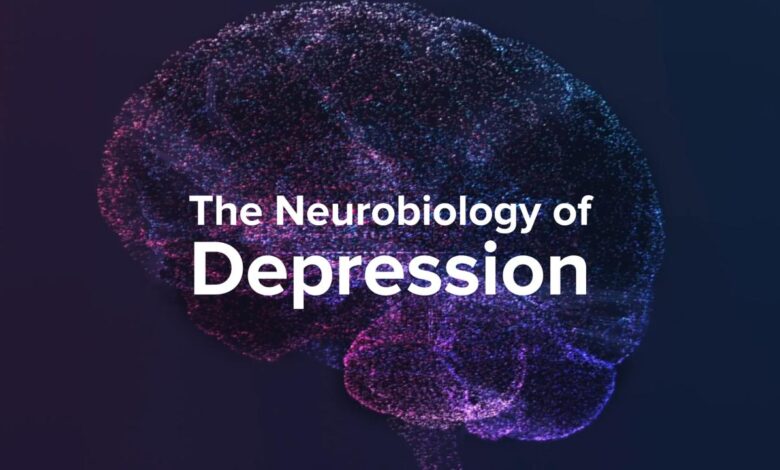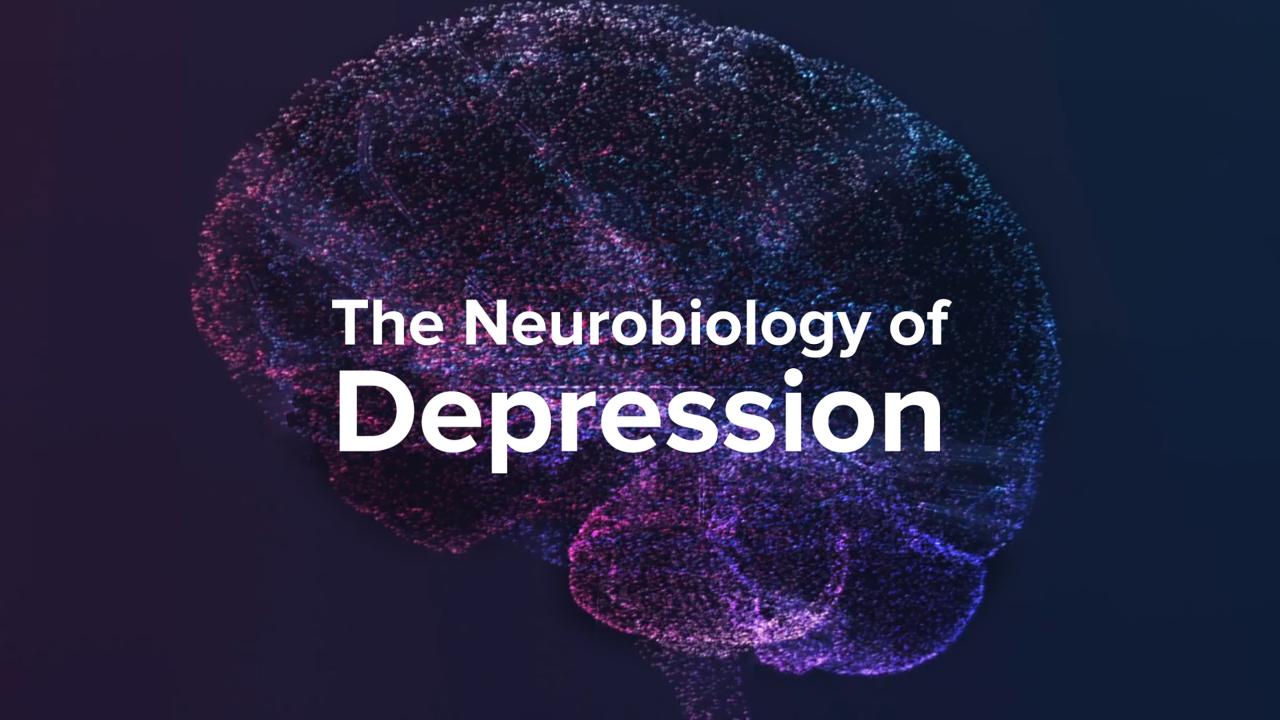
Can depression affect your ability to think? Absolutely. This exploration delves into the complex ways depression impacts cognitive function, from the subtle changes in focus to the more significant challenges in memory and decision-making. We’ll examine the neurobiological underpinnings of these impairments, how they manifest in daily life, and what strategies can help those struggling with these cognitive difficulties.
Depression can manifest in a myriad of ways, impacting individuals differently. While the emotional toll is undeniable, this exploration goes beyond the emotional aspects to analyze the cognitive challenges often overlooked. Understanding the cognitive effects of depression is crucial for recognizing the struggles faced by those living with it and for developing effective support strategies.
Defining Depression’s Impact on Cognition

Depression isn’t just a mood disorder; it significantly impacts cognitive function, affecting a person’s ability to think, learn, and remember. This impairment can range from subtle difficulties to severe challenges, impacting daily life and overall well-being. Understanding the specific ways depression affects cognition is crucial for effective treatment and support.Depression’s influence on cognition stems from complex neurobiological changes within the brain.
These changes disrupt the normal functioning of neural pathways, affecting various cognitive processes. The intricate interplay of neurotransmitters, such as serotonin and dopamine, plays a key role in these disruptions. These neurochemicals are essential for regulating mood, attention, and memory, and their imbalance can lead to a cascade of cognitive impairments. Furthermore, chronic stress associated with depression can further exacerbate these neurobiological changes, creating a vicious cycle.
Neurobiological Mechanisms Underlying Cognitive Impairments
The neurobiological mechanisms underlying cognitive impairments in depression are multifaceted. Neurotransmitter imbalances, particularly reduced levels of serotonin and norepinephrine, are central to these impairments. These neurochemicals are crucial for regulating mood, attention, and memory. Chronic stress associated with depression further disrupts brain function. Studies have shown structural changes in brain regions associated with cognition, such as the hippocampus and prefrontal cortex, which are responsible for learning, memory, and executive functions.
Inflammation, a byproduct of stress, can also contribute to these structural and functional alterations.
Types of Cognitive Deficits Associated with Depression
Cognitive deficits in depression encompass a broad range of impairments. These deficits affect various cognitive domains, impacting daily functioning. Difficulties with attention, concentration, and working memory are common. Problems with executive functions, including planning, organizing, and decision-making, are also frequently observed. Impaired processing speed and reduced cognitive flexibility further contribute to the overall cognitive dysfunction.
Comparison of Cognitive Deficits Across Different Types of Depression
| Type of Depression | Attention | Memory | Executive Function | Processing Speed |
|---|---|---|---|---|
| Major Depressive Disorder | Difficulty sustaining attention, reduced concentration | Impaired short-term and long-term memory, difficulty encoding and retrieving information | Problems with planning, organization, and decision-making | Slower processing speed, reduced reaction time |
| Persistent Depressive Disorder (Dysthymia) | Chronic difficulty focusing and concentrating | Impaired memory, especially for recent events | Reduced ability to plan and execute tasks, difficulty shifting between tasks | Slower processing speed, which can persist even during periods of improved mood |
| Postpartum Depression | Reduced attention span, difficulty concentrating on tasks | Difficulty with memory, especially regarding infant care | Difficulties in making decisions and managing household responsibilities | Slowed processing speed, affecting decision-making |
The table above highlights the common cognitive deficits observed across various types of depression. Note that the severity and specific presentation of these deficits can vary significantly between individuals. The specific symptoms may also depend on the duration and severity of the depressive episode, as well as any co-occurring conditions.
Specific Cognitive Deficits
Depression significantly impacts cognitive function, affecting various mental processes crucial for daily life. These impairments extend beyond simply feeling sad or hopeless; they manifest as concrete difficulties in thinking, learning, and remembering. Understanding these specific deficits is vital for accurate diagnosis and effective treatment strategies.
Attention
Attention, the ability to focus and sustain concentration, is often compromised in individuals experiencing depression. Sustained attention, the ability to focus on a task over a period of time, is frequently disrupted. Individuals may find it challenging to filter out distractions, leading to difficulty concentrating on work or even simple tasks like reading. This can manifest in real-world scenarios as missed deadlines at work, problems following instructions, or difficulty completing household chores.
For example, someone struggling with sustained attention might have difficulty finishing a project at work, or miss important details in a conversation.
Memory
Memory, encompassing encoding, storage, and retrieval of information, is another cognitive domain frequently affected by depression. Both short-term and long-term memory can be impacted. Individuals might experience difficulty recalling recent events, remembering appointments, or even names of familiar people. This can lead to challenges in everyday activities, like misplacing belongings or forgetting appointments. For instance, a depressed individual might struggle to remember what they ate for lunch, or forget a colleague’s name during a meeting.
Working memory, which is crucial for holding and manipulating information in mind, is also frequently affected.
Executive Function, Can depression affect your ability to think
Executive functions encompass a range of higher-order cognitive processes, including planning, organization, problem-solving, and decision-making. Individuals with depression often exhibit difficulties in these areas. Planning and organizing tasks can become significantly challenging, leading to disorganization and procrastination. Problem-solving abilities may also be impaired, making it harder to find solutions to everyday problems. This can manifest in real-world scenarios as difficulty managing time effectively, making decisions, or tackling complex problems at work or home.
For example, a depressed individual might struggle to plan a trip or manage their finances effectively.
Table: Severity and Prevalence of Cognitive Deficits across Depressive Disorders
| Cognitive Domain | Severity (Mild/Moderate/Severe) | Prevalence (e.g., % of individuals with specific disorder) | Depressive Disorder |
|---|---|---|---|
| Attention | Moderate | 60-80% | Major Depressive Disorder |
| Memory | Mild-Moderate | 40-70% | Persistent Depressive Disorder |
| Executive Function | Moderate-Severe | 50-90% | Postpartum Depression |
| Attention | Severe | 20-40% | Major Depressive Disorder with Psychotic Features |
| Memory | Severe | 20-30% | Severe Depression with Cognitive Impairment |
Note: Prevalence rates are estimates and may vary based on specific diagnostic criteria and assessment methods.
Impact on Specific Tasks and Activities
Depression significantly impacts daily life, often manifesting as difficulties in performing tasks that typically require cognitive function. The cognitive impairments associated with depression can create substantial challenges in various aspects of life, including work, school, and social interactions. These challenges stem from the complex interplay of emotional distress, motivational deficits, and the specific cognitive impairments themselves.The impact of depression extends beyond the feeling of sadness.
It profoundly affects the ability to focus, remember, and make decisions, leading to decreased productivity and engagement in daily activities. This, in turn, can have cascading effects on various life domains, creating a cycle of difficulty that can be challenging to break without appropriate support and intervention.
Everyday Tasks and Activities
The cognitive impairments associated with depression can make even simple daily tasks feel overwhelming. Remembering appointments, managing finances, or completing household chores can become significant hurdles. This can lead to feelings of inadequacy and isolation, as individuals struggle to maintain a sense of normalcy and independence.
Impact on Work Performance
Depression can negatively affect job performance in numerous ways. Concentration problems, decreased motivation, and difficulty with decision-making can hinder productivity and efficiency. Individuals may struggle to meet deadlines, complete projects, or engage in collaborative tasks. This can result in decreased work performance evaluations, missed promotions, and ultimately, potential job loss.
Impact on School Performance
Students with depression often experience similar difficulties in the academic setting. Concentration issues, memory problems, and difficulty with learning new material can significantly affect academic performance. Students may struggle to keep up with coursework, participate in class discussions, or complete assignments. This can lead to lower grades, increased stress, and potential academic difficulties.
It’s a common question: can depression really affect your ability to think clearly? Absolutely. The fog can be pretty intense. Thankfully, there are resources available to help manage those challenges, like this new app designed specifically for the Type 2 diabetes community, new app helps type 2 diabetes community. While this app won’t solve every mental health issue, it might offer some valuable tools and support for managing the complexities of diabetes, which can sometimes contribute to depressive symptoms.
Ultimately, though, addressing the root cause of difficulties in thinking is key.
Impact on Social Interactions
Depression can also affect social interactions. Difficulty initiating conversations, maintaining eye contact, or understanding social cues can lead to feelings of isolation and loneliness. Individuals may withdraw from social activities, leading to further isolation and perpetuation of the depressive cycle. The inability to engage in social interactions effectively can significantly impact relationships with friends and family.
Table Illustrating Correlation
| Depressive Symptom | Specific Cognitive Task | Decreased Performance |
|---|---|---|
| Difficulty concentrating | Following a conversation | Easily distracted, difficulty remembering details |
| Memory problems | Remembering appointments | Frequent missed appointments, forgetting important information |
| Decision-making difficulties | Choosing an outfit for work | Excessive time spent deciding, feeling overwhelmed |
| Motivational deficits | Starting a project | Procrastination, difficulty initiating tasks |
| Anhedonia | Engaging in social activities | Lack of interest, avoidance of social interactions |
Factors Influencing Cognitive Impairment: Can Depression Affect Your Ability To Think
Depression’s impact on thinking isn’t a fixed state. Many factors can either exacerbate or alleviate the cognitive difficulties associated with it. Understanding these influences is crucial for developing effective coping strategies and treatment plans. These factors can significantly impact the severity and duration of cognitive symptoms, making it vital to consider them when managing depression.The interplay between medication, therapy, lifestyle choices, and the individual’s response to these factors significantly shapes the experience of cognitive impairment.
Some factors, such as stress and sleep deprivation, can trigger or worsen cognitive symptoms. Conversely, positive lifestyle choices, like regular exercise and a balanced diet, can support cognitive recovery.
Medication’s Impact on Cognitive Function
Medication plays a pivotal role in managing depression and its cognitive symptoms. Antidepressants, while often effective in reducing depressive symptoms, can sometimes cause side effects that impact cognitive function. These side effects can include difficulty concentrating, memory problems, and slowed thinking. Different types of antidepressants have varying effects on cognition. Some may be associated with more pronounced cognitive side effects than others.
Close monitoring and open communication with a healthcare provider are essential for identifying and managing any potential cognitive side effects. For instance, a patient might experience temporary memory issues while on a particular medication, which improves once the dosage is adjusted.
Therapy’s Role in Cognitive Recovery
Therapy, particularly cognitive behavioral therapy (CBT), is recognized for its efficacy in addressing cognitive distortions and improving emotional regulation in individuals with depression. CBT helps individuals identify negative thought patterns and develop healthier coping mechanisms, thus contributing to improved cognitive function. By addressing the underlying psychological factors contributing to depression, therapy can lead to better overall cognitive functioning.
Ever wondered if depression can cloud your thinking? It’s a complex issue, and while not a direct cause, certain lifestyle choices, like the ones behind the diets associated with increased risk of heart disease , can worsen existing mental health challenges. Poor nutrition and lack of exercise can contribute to a decline in cognitive function, which in turn can impact how effectively you process information and make decisions.
So, while depression itself affects thought processes, external factors like diet play a crucial role in overall mental clarity.
A patient undergoing CBT might observe a reduction in racing thoughts and an improvement in their ability to focus, ultimately reducing the cognitive symptoms of depression.
Stress and Cognitive Impairment
Stress is a powerful stressor that can significantly worsen cognitive symptoms in individuals with depression. Chronic stress can lead to impaired memory, reduced attention span, and difficulties with decision-making. The stress response triggers physiological changes that can hinder cognitive processes. Stress can also exacerbate existing cognitive difficulties, making it harder for individuals to manage their symptoms. For example, a person with depression facing a major life event like job loss may experience a significant decline in their cognitive abilities, impacting their ability to perform daily tasks.
Sleep Deprivation and Cognitive Function
Sleep deprivation is another factor that can severely exacerbate cognitive impairment in individuals with depression. Adequate sleep is essential for memory consolidation and cognitive function. When sleep is disrupted, cognitive processes like attention, concentration, and problem-solving suffer. Individuals experiencing sleep deprivation often report difficulties with concentration, memory, and decision-making. Lack of sleep can also increase emotional reactivity, further complicating cognitive challenges for individuals with depression.
A person experiencing sleep deprivation may have a heightened sense of anxiety and difficulty with focus, affecting their cognitive functioning.
Lifestyle Factors and Cognitive Recovery
A balanced lifestyle plays a critical role in the recovery process. Factors like diet, exercise, and social engagement can influence cognitive recovery from depression. A healthy diet rich in fruits, vegetables, and lean proteins supports brain health and can improve cognitive function. Regular exercise promotes blood flow to the brain, leading to improved cognitive function. Engaging in social activities and maintaining strong relationships can also contribute to emotional well-being and cognitive recovery.
| Lifestyle Factor | Impact on Cognitive Recovery |
|---|---|
| Balanced Diet | Supports brain health, potentially improving cognitive function. |
| Regular Exercise | Promotes blood flow to the brain, potentially improving cognitive function. |
| Social Engagement | Contributes to emotional well-being and potentially supports cognitive recovery. |
| Stress Management Techniques | Reduces stress levels, potentially improving cognitive function. |
| Adequate Sleep | Essential for memory consolidation and cognitive function; inadequate sleep worsens symptoms. |
Differentiating Cognitive Impairment from Other Conditions
Navigating the complexities of mental health often involves distinguishing between similar symptoms. Cognitive impairments, while frequently associated with depression, can also manifest in other conditions. Accurately identifying the underlying cause is crucial for effective treatment and management. This process necessitates a comprehensive evaluation, considering not only the cognitive symptoms but also the individual’s overall history and presenting factors.Cognitive symptoms aren’t unique to depression; they can overlap significantly with other mental health conditions.
Differentiating between cognitive impairments stemming from depression and those arising from conditions like anxiety or ADHD requires careful consideration of the nuances in presentation and the interplay of various factors. This distinction is critical for tailoring appropriate interventions and ensuring the most effective therapeutic approach.
Comparing Cognitive Symptoms of Depression, Anxiety, and ADHD
Differentiating cognitive impairments requires a nuanced understanding of how they present in various mental health conditions. While overlap exists, key differences in symptom patterns can aid in diagnosis. Understanding these variations allows clinicians to develop targeted interventions and support tailored to the individual’s specific needs.
| Characteristic | Depression | Anxiety | ADHD |
|---|---|---|---|
| Attention | Difficulty concentrating, distractibility, decreased focus, often accompanied by a sense of mental fogginess. | Difficulty concentrating, especially when experiencing heightened anxiety; attention can be highly selective and focused on perceived threats, or be completely distracted by worries. | Difficulty sustaining attention, easily distracted, impulsivity impacting focus, hyperactivity can be present, making it challenging to remain on task. |
| Memory | Problems with short-term memory, difficulty recalling information, decreased ability to encode new memories, forgetfulness. | Memory problems can manifest in different ways; sometimes heightened anxiety can result in heightened memory for stressful events, while other times, memory difficulties can arise due to excessive worry and preoccupation. | Difficulty with working memory (holding and manipulating information in mind), struggles with remembering instructions or tasks, forgetfulness, but often not as profound as in depression. |
| Executive Function | Problems with planning, decision-making, organization, and problem-solving, often feeling overwhelmed and unable to initiate tasks. | Executive dysfunction can manifest in difficulty prioritizing tasks, planning, and following through on plans; these issues are often worsened by anxiety-related rumination and worry. | Difficulties with planning, organization, and task initiation; impulsivity can impact decision-making and lead to poor judgment, often without the same degree of accompanying emotional distress. |
| Speed of Processing | Slowed processing speed, taking longer to complete tasks, difficulty with mental agility. | Processing speed can vary depending on the type and intensity of anxiety; in some cases, processing speed might be heightened in response to perceived threats. | Processing speed can be variable; some individuals with ADHD might have normal or even above-average processing speed, while others experience significant delays. |
| Mood | Persistent sadness, hopelessness, loss of interest in activities, feelings of worthlessness. | Anxiety is characterized by feelings of worry, fear, and apprehension; these emotions can significantly impact cognitive functioning. | Mood fluctuations can occur, but core features of ADHD do not include persistent sadness or hopelessness. |
Importance of Comprehensive Assessment
A thorough assessment is paramount to accurately differentiate cognitive impairments. A multi-faceted approach involving a detailed history, cognitive testing, and consideration of other relevant factors is essential. This approach allows for a comprehensive understanding of the individual’s presentation, enabling a more accurate diagnosis and tailored treatment plan.
“A comprehensive assessment considers not only the cognitive symptoms but also the individual’s overall history and presenting factors.”
This detailed approach ensures that the diagnostic process is not limited to isolated symptoms but rather encompasses a holistic view of the individual’s experience.
Potential for Cognitive Recovery
Hope often springs eternal, and for individuals experiencing depression, the possibility of cognitive recovery is a beacon of hope. While the cognitive impairments associated with depression can be significant and multifaceted, they are not insurmountable. Research consistently demonstrates that with appropriate intervention, many individuals can experience substantial improvements in their cognitive abilities. This underscores the importance of early diagnosis, comprehensive treatment, and patient engagement in the recovery process.The path to cognitive recovery often involves a multifaceted approach, recognizing that each individual’s experience and needs are unique.
This encompasses not just addressing the underlying depression but also actively working on regaining and strengthening cognitive functions. Therapy, medication, and lifestyle adjustments play critical roles in this process, each contributing to a more comprehensive and effective recovery strategy.
Role of Therapy in Cognitive Recovery
Cognitive behavioral therapy (CBT) is frequently employed to address cognitive distortions and negative thought patterns that contribute to depressive symptoms. CBT techniques can also directly target cognitive deficits, such as memory problems and difficulty concentrating. Through structured exercises and coping mechanisms, CBT helps individuals develop strategies to improve their cognitive functioning. Other forms of psychotherapy, such as interpersonal therapy (IPT) and psychodynamic therapy, can also contribute to cognitive recovery by addressing emotional and interpersonal factors that may be exacerbating cognitive impairments.
Role of Medication in Cognitive Recovery
Antidepressant medications, particularly selective serotonin reuptake inhibitors (SSRIs), are often crucial in managing depressive symptoms. These medications can improve mood and reduce the intensity of depressive symptoms, which in turn can lead to improvements in cognitive function. However, it’s important to note that the effects of medication on cognitive function can vary from person to person and may take time to manifest.
Ever wondered if depression can cloud your thinking? It definitely can, impacting everything from focus to problem-solving. This often gets overlooked when comparing different diets for weight loss, like a keto diet versus a vegan diet. For example, choosing a diet that supports your overall well-being, like is a keto diet better than a vegan diet for weight loss , can have a significant impact on mental clarity.
Ultimately, taking care of your physical health is crucial for maintaining mental sharpness.
Ongoing monitoring and adjustments to medication are often necessary to optimize the therapeutic effect.
Role of Lifestyle Changes in Cognitive Recovery
Adopting a healthy lifestyle plays a significant role in supporting cognitive recovery. Regular exercise, a balanced diet, sufficient sleep, and stress management techniques can significantly improve cognitive function in general and may mitigate the cognitive impairments associated with depression. For example, studies consistently show that regular physical activity can boost mood and improve cognitive abilities, including memory and attention.
Strategies for Cognitive Rehabilitation
Cognitive rehabilitation programs are specifically designed to help individuals with cognitive impairments improve their daily functioning. These programs often involve exercises and activities targeting specific cognitive skills, such as memory, attention, problem-solving, and executive functions. Individualized programs are crucial, tailored to address the specific cognitive challenges faced by each person.
Therapeutic Approaches for Cognitive Impairments
| Therapeutic Approach | Description |
|---|---|
| Cognitive Behavioral Therapy (CBT) | Focuses on identifying and modifying negative thought patterns and behaviors contributing to cognitive deficits. |
| Medication Management | Use of antidepressants and other medications to stabilize mood and reduce symptoms. |
| Lifestyle Interventions | Enhancing diet, exercise, sleep hygiene, and stress management strategies to improve overall well-being. |
| Cognitive Rehabilitation Programs | Structured programs using exercises and activities to improve specific cognitive skills. |
| Interpersonal Therapy (IPT) | Addresses emotional and interpersonal factors that might impact cognitive functioning. |
Illustrative Examples of Cognitive Impact

Depression’s grip extends far beyond emotional distress. It often significantly impacts cognitive function, making everyday tasks challenging. This section provides real-life examples to illustrate the diverse ways depression can affect thinking, memory, and concentration, and highlight the potential for recovery.
Real-Life Experiences of Cognitive Challenges
Individuals experiencing depression often face a range of cognitive difficulties. These struggles can manifest in subtle ways, impacting their ability to perform routine tasks effectively. For instance, simple activities like remembering appointments, managing finances, or concentrating on work can become significant hurdles. These challenges can lead to feelings of inadequacy and isolation, further exacerbating the depressive symptoms.
Navigating Challenges and Achieving Recovery
Recovery from depression-related cognitive impairment is possible. Support systems, including therapy, medication, and lifestyle changes, play a vital role in improving cognitive function. Individuals who actively participate in their treatment and seek professional guidance often experience positive outcomes. Crucially, recognizing the cognitive difficulties and openly discussing them with healthcare professionals are critical steps in the recovery journey.
Case Studies: Cognitive Difficulties in Depression
The following table presents case studies illustrating the cognitive difficulties associated with depression. It highlights the diversity of experiences, the impact on daily life, and the interventions used to facilitate recovery. These cases underscore the importance of personalized treatment approaches.
| Case Study | Cognitive Difficulty | Intervention | Outcome |
|---|---|---|---|
| Case 1: Sarah | Difficulty concentrating, forgetfulness, decreased motivation | Cognitive Behavioral Therapy (CBT), medication (antidepressant), lifestyle modifications (regular exercise, balanced diet) | Improved concentration, better memory, increased motivation, reduced depressive symptoms. |
| Case 2: David | Problems with decision-making, planning, and problem-solving | CBT, mindfulness techniques, support groups | Improved decision-making abilities, better planning skills, enhanced problem-solving capacity, decreased feelings of overwhelm. |
| Case 3: Emily | Difficulty with processing information, reduced working memory | Medication (antidepressant), neuropsychological assessment, support from family and friends | Improved information processing speed, enhanced working memory capacity, improved overall cognitive functioning. |
| Case 4: Mark | Persistent feelings of confusion, difficulty recalling recent events, reduced speed of thought | Medication (antidepressant), regular cognitive exercises, therapy sessions | Reduced confusion, improved memory for recent events, increased speed of thought, overall improvement in cognitive clarity. |
Final Thoughts
In conclusion, the answer to “can depression affect your ability to think” is a resounding yes. Depression significantly impacts cognitive functions, impacting attention, memory, and executive functioning. Understanding these impacts is key to offering support and developing effective strategies for recovery. We’ve explored the nuances of these effects, highlighting the importance of recognizing and addressing these cognitive impairments alongside the emotional ones.
Ultimately, early intervention and comprehensive care can make a substantial difference in navigating the challenges associated with depression and fostering cognitive recovery.




